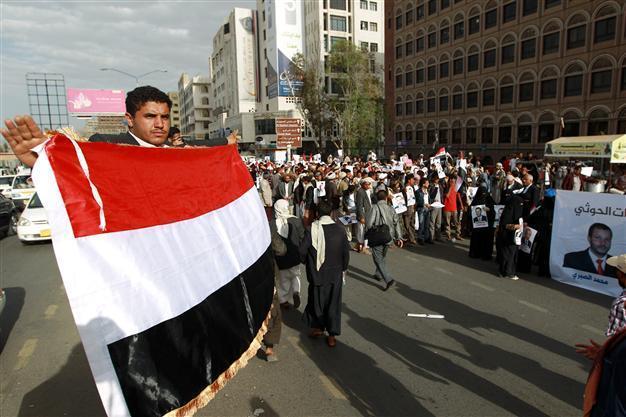Gulf states say Yemen crisis talks open to Huthis
RIYADH - Agence France-Presse

A Yemeni man holds a giant national flag during a demonstration against the Shiite Huthi movement which overran the capital in September on March 4, 2015 in the capital Sanaa. AFP Photo.
Talks aimed at pulling Yemen out of crisis are open to the Shiite Huthi militia which seized power in Sanaa last month, Qatar's Foreign Minister Khalid al-Attiyah said on March 12.
The Huthis have so far opposed any change in venue for UN-brokered talks which broke down after Western-backed President Abedrabbo Mansour Hadi escaped from house arrest in Sanaa last month and resumed power from second city Aden in the south.
With no agreement on a venue to continue dialogue inside Yemen, Hadi proposed that talks move to neighbouring Saudi Arabia.
The six Sunni-dominated Gulf Cooperation Council members agreed to that request last Monday but have not set a date for the meeting.
"The invitation concerns the Huthis," Attiyah, whose country currently holds the GCC's rotating presidency, told reporters following a meeting of Gulf foreign ministers in the Saudi capital.
"It's their business to accept or not."
GCC Secretary General Abdullatif al-Zayani confirmed that "the invitation was addressed to all" protagonists in the crisis in Yemen, which is a frontline in the United States war against Al-Qaeda.
At the joint news conference with Attiyah, Zayani underlined that anyone joining the negotiations must adhere to Hadi's conditions.
These include rejecting "the coup d'etat" by the Huthis, returning seized military equipment and allowing the state "to recover its authority over all territory," Hadi said in a letter to Saudi Arabia's King Salman.
The talks would aim for a resumption of the political process begun after the departure of former president Ali Abdullah Saleh in early 2012 after a bloody year-long popular uprising.
The process, which stalled after Huthis overran Sanaa in September, called for turning the republic into a federation of six regions. Huthis have rejected that idea, saying it would divide the country into rich and poor areas.
They have instead favoured the "national dialogue" in the capital Sanaa under the supervision of UN envoy Jamal Benomar.
The planned talks in Riyadh would be a separate initiative, Zayani said.
Saleh's General People's Congress party has also warned that it will boycott talks held outside Sanaa. Saleh is widely accused of backing the Huthis.
Separatists from southern Yemen have taken an opposite point of view. They suspended their participation in the UN-sponsored discussions until they are moved abroad.
The Gulf states are deeply suspicious of the Huthis, fearing they will take Yemen into the orbit of Shiite Iran.
